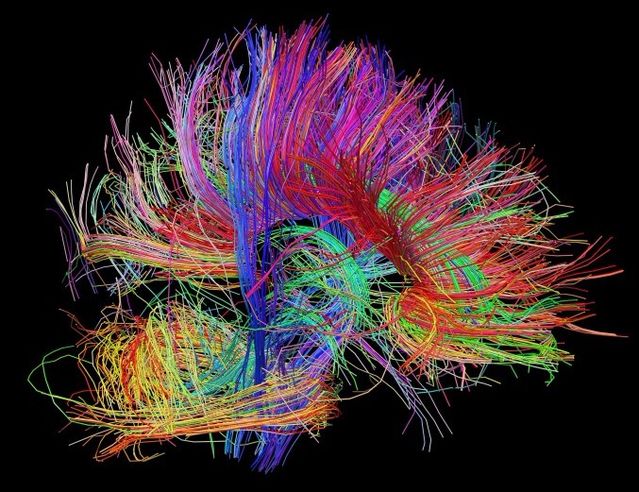Health
Better Brain Health Is Possible Without Exercise Fanaticism
Low-to-moderate fitness strengthens the functional connectivity of your brain.
Posted November 6, 2015

If you hate to exercise, I have good news. A new study reports that people with low-to-moderate aerobic fitness have better brain health and stronger connections between different regions of the brain—even if they don't exercise habitually.
In recent years, physical activity and cardiorespiratory fitness have both been associated with protecting against age-related cognitive decline and a lower risk for dementia. The new findings suggest that any level of cardiorespiratory fitness—a basic measurement of aerobic endurance—is correlated with healthier brain connections and likely improves long-term brain function, especially as you get older.
In their latest study, researchers from the Beckman Institute at the University of Illinois at Urbana-Champaign found that although aerobic fitness is associated with age-related brain benefits, you don’t have to be an exercise fanatic to reap the neuroprotective benefits of low-to-moderate physical endurance.
Any Level of Aerobic Fitness Can Benefit Brain Health
The November 2015 study,”Fitness, But not Physical Activity, Is Related to Functional Integrity of Brain Networks Associated with Aging," was published in the journal NeuroImage. The study shows that age-related differences in brain health vary depending on fitness levels in older adults.
Michelle Voss led the study while a postdoctoral researcher at the University of Illinois with Beckman Institute director Arthur Kramer and kinesiology and community health professor Edward McAuley. Voss is now an assistant professor at the University of Iowa.
The researchers said that the primary goal of this study was, “to evaluate the independent relationships between physical activity and fitness with functional brain health among healthy older adults, as measured by the functional connectivity of cognitively and clinically relevant resting state networks."
Normal aging is associated with selective disruption of the functional connectivity between large-scale brain networks. Voss et al used functional magnetic resonance imaging (fMRI) to measure the strength of the connections throughout the brain in younger and older adults while they were at rest.
Previous research has shown that some of these connections weaken as someone gets older and are indicative of deteriorating brain health. The researchers were able to confirm that, in general, most brain connections were weaker for older adults when compared with younger adults.
The researchers were also able to identify that cardiorespiratory fitness has a positive relationship with functional connectivity of several cortical networks associated with age-related decline. Interestingly, these effects were strongest in the default mode network (DMN).
In a press release, Kramer described these findings, "Our study provides the strongest evidence to date that fitness in an older adult population can have substantial benefits to brain health in terms of the functional connections of different regions of the brain.”
Avoiding a Sedentary Lifestyle Benefits White Matter Integrity As You Age
In previous Psychology Today blog posts, I've written extensively about other research conducted by Kramer and his colleagues on the correlation between physical activity, cardiorespiratory fitness, and better brain connectivity being linked to improved white matter integrity. White matter transmits signals from one region of the cerebrum to another and between the cerebrum and lower brain centers.
A 2014 study from the Beckman Institute, “Physical Activity and Cardiorespiratory Fitness Are Beneficial for White Matter in Low-Fit Older Adults,” was published in the journal PLOS ONE. In this study, the researchers found a strong link between the structural integrity of white matter tracts and an older person's level of daily activity.

Interestingly, it wasn't the extent to which a person engaged in moderate or vigorous exercise, but rather if he or she spent most of the day being sedentary. Avoiding sedentarism appears to benefit brain health by maintaining the integrity of your white matter.
Apparently, Hippocrates was right when he said, “Walking is the best medicine.” Art Kramer has spent decades researching the brain benefits of physical activity and aerobic fitness. In a conversation last year, Kramer told me that the best news about the 2014 findings were that you don’t necessarily have to be running marathons or winning triathlons to reap the brain benefits of physical activity. I couldn't agree more.
The findings indicate that just a little bit of physical activity every day helps preserve the integrity of your brain’s white matter. In our conversation, Kramer emphasized that ultimately the study shows that the real enemy to brain health is sitting all day.
Conclusion: You Don’t Have to Be an Exercise Fanatic to Benefit from Low-to-Moderate Aerobic Fitness
One of the most interesting aspects of this new study is the discovery that cardiorespiratory fitness plays a role in brain health which seems to go beyond habitual physical activity.
It appears that any level of aerobic fitness is associated with some improved brain function and structural connectivity independent of the amount of physical activity someone is doing regularly. In a press release, Voss concluded,
"An encouraging pattern in the data from our study and others is that the benefits of fitness seem to occur within the low-to-moderate range of endurance, suggesting that the benefits of fitness for the brain may not depend on being extremely fit.
The idea that fitness could be related to brain health regardless of one's physical activity levels is intriguing because it suggests there could be clues in how the body adapts for some people more than others from regular activity. This will help our understanding of how fitness protects against age-related cognitive decline and dementia."
There is one important caveat. Although it appears from this study that some people may be predisposed to reap the brain benefits of aerobic fitness without doing much cardio... For a variety of health reasons, some type of daily physical activity—such as going for a walk—is always a good idea.
Please, don't interpret these findings as an excuse to become a couch potato. There are infinite other studies which have found that the key to maintaining a healthy mind, in a healthy body throughout a person's lifespan is directly linked to staying physically active. Again, this doesn't mean you have to be an exercise fanatic. Any type of activity that prevents you from sitting all day appears to have neuroprotective benefits.
If you'd like to read more on this topic, check out my Psychology Today blog posts,
- "Why Does Physical Inactivity Drain Human Brain Power?"
- "Very Small Amounts of Exercise Can Reap Huge Benefits"
- "Hippocrates Was Right: "Walking Is the Best Medicine"
- "Physical Activity Is the No. 1 Way to Keep Your Brain Young"
- "Why Does Physical Activity Improve Cognitive Flexibility?"
- "Making Exercise a Habit Prevents Age-Related "Brain Drain""
- "The Brain Drain of Inactivity"
- "Sitting All Day Increases Your Risk of Anxiety"
- "Sitting Can Drain Brain Power and Stifle Creativity"
- "What Is the Human Connectome Project? Why Should You Care?"
- "How Could "Brain Observatories" Help the BRAIN Initiative?"
© 2015 Christopher Bergland. All rights reserved.
Follow me on Twitter @ckbergland or updates on The Athlete's Way blog posts.
The Athlete’s Way ® is a registered trademark of Christopher Bergland.




